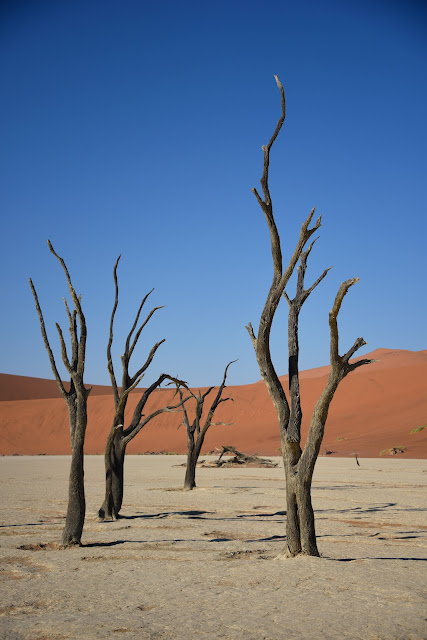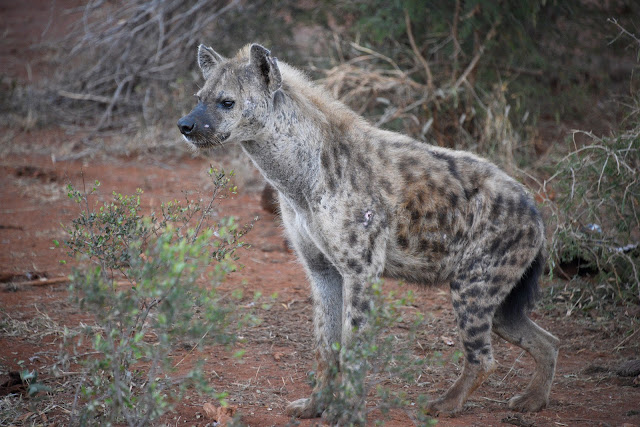Total Pageviews
Tuesday, December 19, 2023
Deeply Rooted: Gratitude, Joy, and Camel Thorn Trees
Tuesday, November 28, 2023
Scary Stories: Hyenas and Fear and Gratitude revisited..
It's been a little over 6 years since I wrote the blog about Hyena's and what they taught me about beauty and gratitude. Maybe it's the time of year, Thanksgiving is over and we are heading into Christmas-- both holidays instill a sense of extra gratitude into everyday life. Maybe it's because even though my mom has been gone for 4 years now, her loss is felt deeper during the holidays. And maybe it's because I have people who are dear to me going through some really hard stuff, and I find myself praying extra hard for God to help them. But whatever the reason, I've been thinking about gratitude in the midst of life.... and how very hard it is sometimes to be grateful.
And that brings me to one of what I call my scary Bible stories. It's the story of Job. And this story, for whatever reason, has always been a kind of scary one to me. Kind of like those creepy nursery rhymes we all learned when we were little and didn't understand what we were reading. Then we grew up and were kind of mortified to discover the meaning behind some of the "rhymes." So to hopefully do this story justice let's start with the story in the Bible.
"In the land of Uz there lived a man whose name was Job. This man was blameless and upright; he feared God and shunned evil. He had seven sons and three daughters. He was the greatest man among all the people of the East. His sons used to take turns holding feasts in their homes, and they would invite their three sisters to eat and drink with them. When a period of feasting had run it's course, Job would send and have them purified. Early in the morning he would sacrifice a burnt offering for each of them, thinking, Perhaps my children have sinned and cursed God in their hearts. This was Job's regular custom." Job 1: 1-2, 4-5
So the story starts out in a good way. There's this guy Job, who is wealthy, but he's a really good guy. I mean, it says he is blameless and that he honors God. He does everything he is supposed to do and he does it in the right way. But then the villain shows up (Satan) and the story takes a dark turn. God points out Job and his faithfulness. And in my brain it's almost like Satan dares God to place a bet on Job's goodness. He (Satan) argues that of course Job is blameless, because it's easy to be faithful to God when life is good. Satan makes the argument that Job's faithfulness to God is shallow and would go away if all of his blessings went away. And God takes the bet. He gives Satan free range to take everything from Job, everything but his life.
And this is the beginning of the scary part of the story. Job loses everything. His wealth, his children, his influence, his friends, and even his health. What I find interesting is Job's response to the news of the loss of his wealth and children:
"At this, Job got up and tore his robe and shaved his head. Then he fell to the ground in worship and said: Naked I came from my mother's womb and naked I will depart. The Lord gave and the Lord has taken away; may the name of the Lord be praised. In all this, Job did not sin by charging God with wrongdoing." Jobe 1:20-22
Wow! What a response. I would love to say that I would respond the same way. I have my doubts. I am not on Job's level. At all. But while I was admiring Job's response I found this passage in Job that I know I have read several times before, but it stood out to me this time. In Job 3:25 Job states, " What I feared has come upon me; what I dreaded has happened to me." Huh. I guess in all the times I have read and studied this story, I never once thought about Job having fears before all the bad stuff. But then I re-read verses 4-5 in chapter one, you know, the ones where Job offered sacrifices for his children, in case they sinned? That sounds like a worried parent, maybe even a parent who had fears around his children.
Ok, so now I have to realign my narrative of this scary story. Although Job was a righteous and blameless man, he was still very human, and he had FEARS. And yet, even though he had fears, he was still considered blameless. Okay.
What do you fear? I personally have a lot of them, if I think about it. Most of what I fear is not crippling, and some of the things I fear are not based on rational or even plausible things. A silly example of what I fear: We once watched this show about cave diving, people who dive with oxygen tanks in underwater caves. While watching this show one of the divers got stuck while swimming through a narrow passage. There was all this drama about this person getting un-stuck before their oxygen in the tank ran out. Once they finally managed to get this individual unstuck, there was still the concern about them having enough oxygen to get to the surface. I'll admit, before I watched this show, I never had a fear of dying stuck in an underwater cave without oxygen before. I do now. But it's a silly fear because I will never, ever, take up the sport of cave diving.
Six years ago, when I wrote the blog about Hyena's and fear, and gratitude... we were facing the very real fear of my Mom's battle with cancer. And I would love to say that I was this super Christian through that process. That I always had peace, that I never doubted God, that I didn't struggle. But of course I did. I'm so very human. And in my mind, not only am I so very human, but I will never be a 'Job." I will never be able to react like Job did. How on earth did he do it?
While Job has this incredible faith and hope in God, he's still very human. And this is what I love about this scary story. Job doesn't suffer in silence. He instead cries out to God. And he's honest about what's happening. He's honest about his sorrow. He's honest about his loss. But he also understands who God is. And even in his honesty, his anguish, his hardship... Job still looks to God with hope.
In Job 6:10 he says, "Then I would still have this consolation-- my joy in unrelenting pain-- that I had not denied the words of the Holy One." In Job 13:15 he says, "Though he slay me, yet I will hope in him." In Job 14:14 he says "I will wait for my renewal to come." In Job 23:10 he says, "He knows the way I take; when he has tested me I will come forth as gold." Again and again, despite his circumstances, despite others telling Job a different story, Job returns and clings to what he knows of God's nature.
And for me, that's what turns this scary story into one of the most hopeful stories in the Bible. You see, Job knew God. Job understood not only the nature of God, but he also understood his own unworthiness. He understood that God was all powerful, all knowing, Holy, and deserving of our praise. Job understood that even he, who was considered as blameless by God, was born a sinner in need of being saved by God. Job understood that even if he died during all of these trials, he would still gain something so much more, an eternal life with God in heaven. Job placed value in the right places. It doesn't mean he didn't value his wealth, he just didn't value it more than his relationship with God. It doesn't mean that he didn't value his family, he obviously valued his children so much that he took it upon himself to intercede with God for them by offering up sacrifices on their behalf. That's a lot of work and time and effort -- to make a sacrifice for each child-- he greatly valued his children. But there was only one God in Job's life.
Job not only placed God as the head of his life, he also spent time with God. It says he was totally devoted to God. We know he made regular sacrifices to God. I think it is safe to assume that he prayed to God regularly and often. In Job 23:11-12 Job says, " My feet have closely followed his steps; I have kept his way without turning aside. I have not departed from the commands of his lips; I have treasured the words of his mount more than my daily bread." He actively sought to know God. So when Job's "friends" came to him, trying to tell him things about God that were untrue? Job had a relationship with God to fall back on. He could hold onto his hope because he trusted what he already knew about God.
So that's just a simple taste of how Job made it through the utter devastation of his life. How he lived through and faced one of the greatest fears of his life. Job placed God as first in his life. Job actively sought to know and understand who God is and what His will was for his life. And he clung to what he knew about God's nature. I am by no means a scholar or a teacher. I will be the first to admit that there's a lot more buried in this story for me to learn. I'll keep reading this story.
So, I am writing all of this to hopefully encourage you. I know it's encouraging to me. I still have fears. Life is still life, and sometimes it's hard and seems unfair. I stumble. I doubt. I am hopeful. And I can still be joyful. Through it all. I have a God who sees it all. I have a God who sees me, all of me, and still loves me. I am still so very human. But He is still so very God. And the best news of all? You have the same God that I do. You have the same access that I do. And I can tell you that He is a good God, even when life isn't good.
And I saved the best part of the story for the end. Job 42: 5 records some of that last words that Job spoke, "My ears had heard of you but now my eyes have seen you." This man, who knew God like no one else did, who clung to the hope he knew he had in God, acknowledges that he still had a lot to learn about God and who He is. It says that the Lord blessed the latter years of Job's life more that the first. And the last line in the book of Job says he died an old man with a full life.
In 2019, I had the opportunity to travel back to my beloved Africa. And I was able to spend some more time with one of my favorite animals, the Hyena. I am still fascinated by them, still amazed by them, and yes, still house a healthy fear of them. My mom died later that year after her nearly 15 year battle with cancer. One of my greatest fears realized... and yet I am still grateful. I can still see the beauty in the middle of the pain. Her funeral was standing room only-- and a lot of those in attendance were those she had touched and ministered too after she was diagnosed with cancer. Her memorial was not only a celebration of her life, but more importantly it was a celebration of the goodness of God. People still send me "Verna" stories to this day-- stories about how my mom encouraged them, loved them, showed them the love of God. It's a good ending to a scary story. And it's not the end, I'll see her again one day. So, I'll leave you with some not so scary photos that I took of Hyena's the year I lost my mom. I hope you enjoy them.
Monday, November 6, 2023
What Floats Your Boat?
Monday, October 30, 2023
Distinctly Different and Purposefully Created

































